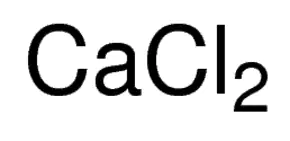
Calcium chloride is a commonly used reagent in biochemistry. Calcium plays important roles in many biological processes, including signal transduction, muscle contraction, and maintenance of cell membrane and cell wall stability. Calcium chloride is used in the preparation and transformation of competent E. coli and in the transfection of eukaryotic cells with either plasmid DNA or high molecular weight genomic DNA. A protocol for the concentration of virus vectors that uses CaCl2 has been published. CaCl2 has been used in the stabilization and two-dimensional crystallization of the NADH-ubiquinone oxidoreductase (complex I) from Escherichia coli. The crystallization of porcine pancreatic elastase in the presence of CaCl2 in the presence of sodium citrate reveals binding of calcium in the metal binding site of the protein. The effect of CaCl2 on the total fluorescence in the polymerication of the tubulin-like FtsZ division protein of Escherichia coli has been studied by a multiwell fluorescent assay.
| Molecular Weight | 110.98 |
| Formula | CaCl2 |
| CAS Number | 10043-52-4 |
| Solubility (25°C) | Water 300 mg/mL |
| Storage | RT, dry, sealed |
| Species | Mouse | Rat | Rabbit | Guinea pig | Hamster | Dog |
| Weight (kg) | 0.02 | 0.15 | 1.8 | 0.4 | 0.08 | 10 |
| Body Surface Area (m2) | 0.007 | 0.025 | 0.15 | 0.05 | 0.02 | 0.5 |
| Km factor | 3 | 6 | 12 | 8 | 5 | 20 |
| Animal A (mg/kg) = Animal B (mg/kg) multiplied by | Animal B Km |
| Animal A Km |
For example, to modify the dose of Compound A used for a mouse (20 mg/kg) to a dose based on the BSA for a rat, multiply 20 mg/kg by the Km factor for a mouse and then divide by the Km factor for a rat. This calculation results in a rat equivalent dose for Compound A of 10 mg/kg.
| Related Products |
|---|
| Poly(ethylene glycol) diacrylate
Poly(ethylene glycol) diacrylate (PEGDA) is a blank slate hydrogel that gels rapidly at room temperature in the presence of a photoinitiator and light. PEGDA hydrogels are potent tools for uncovering basic cellular biology. PEGDA is an emerging scaffold for tissue engineering and regenerative medicine since polymerization can occur rapidly at room temperature, requires low energy input, has high water content, is elastic, and can be customized to include a variety of biological molecules. |
| Isothiuronium
Isothiouronium is a functional group, it is the acid salt of isothiourea. |
| Sultosilic acid, piperazine salt
Sultosilic acid piperazine salt is a compound with lowering lipid activity. It causes significant shortening of the euglobulin lysis time and a significant diminution of platelet adhesiveness, as well as statistically significant decrease of triglycerides, total cholesterol, beta- and pre-beta-cholesterol and an increase of alpha-cholesterol. |
| Ipamorelin
Ipamorelin (NNC-26-0161) is a a novel and potent ghrelin mimetic peptide compound that counteracts glucocorticoid-induced decrease in bone formation of adult rats. |
| PRGL493
PRGL493 is a potent and selective long-chain acyl-CoA synthetase 4 (ACSL4) inhibitor. PRGL493 blocks cell proliferation and tumor growth in both breast and prostate cellular and animal models. |


Products are for research use only. Not for human use. We do not sell to patients.
© Copyright 2010-2023 AbMole BioScience. All Rights Reserved.
